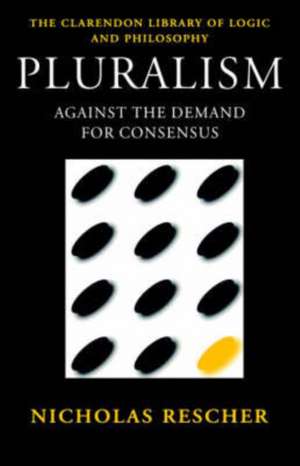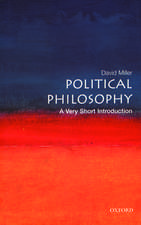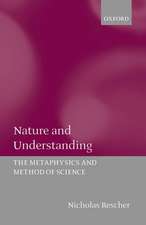Pluralism: Against the Demand for Consensus: Clarendon Library of Logic and Philosophy
Autor Nicholas Rescheren Limba Engleză Paperback – 14 sep 1995
Din seria Clarendon Library of Logic and Philosophy
- 10%
 Preț: 238.61 lei
Preț: 238.61 lei - 34%
 Preț: 687.51 lei
Preț: 687.51 lei - 27%
 Preț: 365.40 lei
Preț: 365.40 lei - 12%
 Preț: 334.27 lei
Preț: 334.27 lei - 19%
 Preț: 273.82 lei
Preț: 273.82 lei - 23%
 Preț: 361.03 lei
Preț: 361.03 lei - 18%
 Preț: 335.81 lei
Preț: 335.81 lei - 28%
 Preț: 473.83 lei
Preț: 473.83 lei - 28%
 Preț: 338.58 lei
Preț: 338.58 lei - 5%
 Preț: 257.97 lei
Preț: 257.97 lei - 12%
 Preț: 334.69 lei
Preț: 334.69 lei -
 Preț: 334.89 lei
Preț: 334.89 lei - 34%
 Preț: 814.70 lei
Preț: 814.70 lei - 34%
 Preț: 653.58 lei
Preț: 653.58 lei - 34%
 Preț: 774.21 lei
Preț: 774.21 lei - 34%
 Preț: 967.04 lei
Preț: 967.04 lei - 31%
 Preț: 371.14 lei
Preț: 371.14 lei - 34%
 Preț: 715.13 lei
Preț: 715.13 lei - 34%
 Preț: 712.96 lei
Preț: 712.96 lei - 31%
 Preț: 468.31 lei
Preț: 468.31 lei - 18%
 Preț: 309.61 lei
Preț: 309.61 lei - 22%
 Preț: 318.01 lei
Preț: 318.01 lei - 34%
 Preț: 628.96 lei
Preț: 628.96 lei - 34%
 Preț: 671.15 lei
Preț: 671.15 lei - 18%
 Preț: 187.23 lei
Preț: 187.23 lei - 18%
 Preț: 346.23 lei
Preț: 346.23 lei
Preț: 379.00 lei
Preț vechi: 525.42 lei
-28% Nou
Puncte Express: 569
Preț estimativ în valută:
72.52€ • 75.72$ • 60.02£
72.52€ • 75.72$ • 60.02£
Carte tipărită la comandă
Livrare economică 25-31 martie
Preluare comenzi: 021 569.72.76
Specificații
ISBN-13: 9780198236016
ISBN-10: 0198236018
Pagini: 216
Ilustrații: line figures, tables
Dimensiuni: 138 x 215 x 13 mm
Greutate: 0.29 kg
Ediția:Revised
Editura: OUP OXFORD
Colecția OUP Oxford
Seria Clarendon Library of Logic and Philosophy
Locul publicării:Oxford, United Kingdom
ISBN-10: 0198236018
Pagini: 216
Ilustrații: line figures, tables
Dimensiuni: 138 x 215 x 13 mm
Greutate: 0.29 kg
Ediția:Revised
Editura: OUP OXFORD
Colecția OUP Oxford
Seria Clarendon Library of Logic and Philosophy
Locul publicării:Oxford, United Kingdom
Recenzii
Rescher provides a cogent and sustained attack on the thesis that consensus is necessary and sufficient and desirable for rationality, truth, communication, cooperation, and social order. He also offers a powerful argument in favor of dissensus ... Highly recommended for all libraries.













